Michael Patrick Hicks's Blog, page 7
November 16, 2018
Review: The Sorrows by Jonathan Janz

The Sorrows (Fiction Without Frontiers)
By Jonathan Janz
My rating: 5 of 5 stars
When Samhain Publishing shut down in 2016, readers lost a wealth of great horror novels and up-and-coming authors. Granted, many of those books have found their way back to market in some form or another and those authors have been able to pursue new opportunities in indie publishing, either self-publishing or signing on with small presses. One of the hardest losses for me was the wealth of material from Jonathan Janz that up and vanished. Luckily, new publisher Flame Tree Press snatched him up and will be publishing his new titles along with his entire back-list.
Originally published in 2011, The Sorrows is the first to get a reissue. Fittingly enough, this was also Janz's debut novel, although it sure as hell doesn't feel like it. Coming into The Sorrows for the very first time seven years after its first publication date, I'm a bit surprised at just how much it doesn't feel like a first novel.
Usually when you've been reading an author's later works, you can tell you're taking a few steps back with their earlier stuff. Typically, those books just don't feel as polished or maybe the author hasn't quite found his voice yet, or possibly some plot points are a little sticky, if not downright sloppy, regardless of whatever promise they show. They're young pups learning their craft, a rising star whose hasn't quite found his groove yet. You've know they've got that special something, but they just haven't hit their fullest potential yet.
Well, The Sorrows doesn't suffer from any of that first-novel syndrome, and, man, Jonathan Janz hit the fucking ground running with this one. It makes me wonder how many shoddy trunk novels this dude squirreled away before he felt sure enough of his own talents that he finally pursued publication. Seems to me, Janz emerged fully-formed, his authorial voice strong, and his talents firmly on display and ready to rock. Maybe it seemed this way to Janz, too - The Sorrows is peppered with references of things to come. Take, for instance, the name of the film many of this book's characters operate on the periphery of, House of Skin, a film that shares the title and plot elements of Janz's second (and, at the time of this book's original publication date, then unpublished) novel. Even our lead male protag's name will sound awfully familiar to those familiar with the setting of Savage Species and Children of the Dark.
Ben Shadeland is a film composer with writer's block. Not a good thing to have when the film he's supposed to be scoring is ready to get locked-in and its release date is coming up fast. Hoping to avoid a breach of contract lawsuit, Ben's partner Eddie has them and their assistants, Eva and Claire, flown out to an abandoned castle situated upon an isolated island sure to get the creative juices flowing. Since this is a horror novel, there's plenty of other bodily fluids flowing and spilling all over the place, too.
What's most interesting about The Sorrows is the plot itself, particularly in the clever ways Janz develops and subverts the haunted house genre. While it shares plenty of aspects and more than a few devices with your typical ghost story, Janz takes it up a few notches, giving readers not only a haunted castle, but haunted people as well, along with a really interesting development that I didn't see coming.
This is a dazzling story, and the horror tropes at the core of it are well explored, particularly the history of Castle Blackwood and the ignominious murders that have since left it deserted. Janz's talents in delivering a fully and deeply layered horror story are solidly evident here, as is his incredible knack for characterization. Early in the book's opening, we get a look at Ben's marital troubles and the anguish his separation from his son is causing. We don't spend a lot of time with his ex-wife, but based on the state three-year-old Joshua is in, this probably isn't a bad thing at all. Through only a few sentences, Janz is able to tell us a lot about the kind of mother Jenny is, and we can infer pretty easily the type of spouse she was for Ben. I've always been impressed with how Janz can communicate so much about his characters in so little words, in such small spaces, and immediately get us to ally ourselves with his protagonist and hate his repulsive human antagonists. It's a talent he's only gotten better at since this debut, but even here it's still pretty damn sharp.
Pretty damn sharp, too, was Flame Tree Press for locking down the rights to Janz's work. That's some smart business sense right there, and I'm looking forward seeing the rest of this author's catalog getting a rapid release over the course of next year. There's a lot of Janz's books I haven't read yet, and I'm excited to dive into them as they relaunch. With a brand-new release dropping in the middle of all this, it's safe to say 2019 will be the Year of Janz and I, for one, will be celebrating all year long.
[Note: I received an advanced reading copy of this title from the publisher, Flame Tree Press, via NetGalley.]
View all my reviews
Review: The Summer Job by Adam Cesare [audiobook]
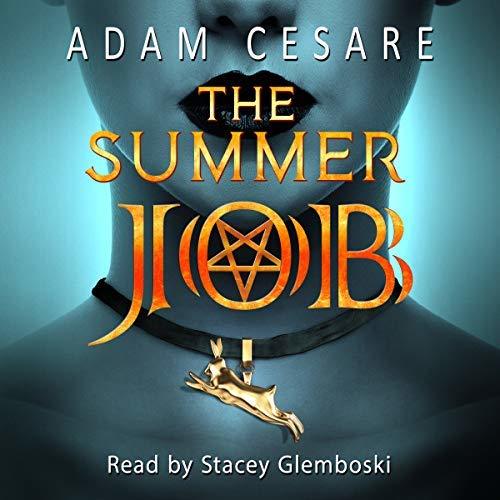
The Summer Job: A Satanic Thriller
By Adam Cesare
My rating: 5 of 5 stars
In a recent blog post to promote the audiobook release of The Summer Job, Adam Cesare wrote about how it hasn't been as successful sales-wise as his Video Night but that he's still hopeful it's able to find the right audience. "While I’d never say one of my books is better than the other, I will say that The Summer Job feels more personal," he said. Following Cesare online, through his blog and social media, anytime The Summer Job comes up, it's obvious that this book has a very special place in his heart and that he is - rightfully - damn proud of the work he did here.
The Summer Job is a work of satanic folk horror that finds goth-punk chick Claire taking a job at the Brandt Hotel. Located in a small town a few hours outside Boston, the hotel is Mission's best-kept secret - a popular and well-regarded establishment, it's been highly praised by past guests. Or at least those who have lived long enough to talk up the perks of their accommodations. When Claire takes on the role of guest liaison, she thinks it's a chance to redefine her life and maybe reinvent herself. It's not until later, of course, that all the peculiarities of the Brandt and its staff start pointing toward much, much darker secrets...
Whether you read or listen to the audiobook edition, it's readily apparent that The Summer Job is a labor of love. I've read, maybe, half of Cesare's oeuvre thus far and I dig his style and startlingly clear affection for the horror genre a lot. The Summer Job, though, is Cesare operating a higher level. His characters and their story arcs are pretty phenomenal, and the writing is solidly on-point.
Early on, he describes a chef behind the pick-up counter at a restaurant as being window-boxed by the frame; it's a small thing to be sure, but the particular word choice and details provided are careful and deliberate, as are a lot of Cesare's other stylistic choices here. The ensuing description of the man's sweat clouding the metal counter-top, and the dialogue between him and Claire, make for a highly memorable and cinematic scene that cements exactly who these characters are, and more importantly that Cesare knows exactly who these characters are. He knows these people and he's smart enough to get out of their way and let them work their mojo. Through a bit of deft dialogue, he introduces Claire's friend Allison, along with her particular ticks that let you know right off the bat who this girl is, unnecessary abbreviations and all. "What are you doing on the Newb," she asks Claire, referring to Newbury Street, and calling her "babykins."
Cesare's operating in a character-rich environment here and we get to know most of his cast very, very well over the course of the book. This is both good and bad. Good because we become intimately familiar with Claire and the people of Mission, and bad because getting to know the employees of the Brandt means we can't fully trust any of them and we're constantly on edge waiting for them to freak out. Cesare does a fantastic job establishing Mission's behind-the-scenes power struggles, letting readers in on alliances, history, and secrets Claire isn't privy to. We worry about her, and Claire is pretty damn easy to sympathize with, even as we're never sure what those around her want or what they'll do to get it.
The Summer Job has a lot going for it, from its leading lady to the clashes between opposing forces within Mission, but reigning supreme over it all is narrator Stacey Glemboski. It didn't take me long to start searching out other titles she's narrated, knowing full well that I'm going to be looking for more of her work. She's an excellent narrator, shifting smoothly between male and female voices, accents, tones, and delivery. This isn't a long book, less than eight hours, but it's so easy to listen and sink into that it feels much shorter.
Between Cesare's writing and deft characters and Glemboski's reading, I was freaking hooked the whole through. The Summer Job was absolutely terrific, and also a necessary reminder that I really need to get my ass in gear and fill those gaps that I've missed in Cesare's work.
[Note: I received an Audible copy of this title from the author following my request through AudioBookBoom and I provided this voluntary review.]
View all my reviews
November 12, 2018
Review: Night Shift by Robin Triggs
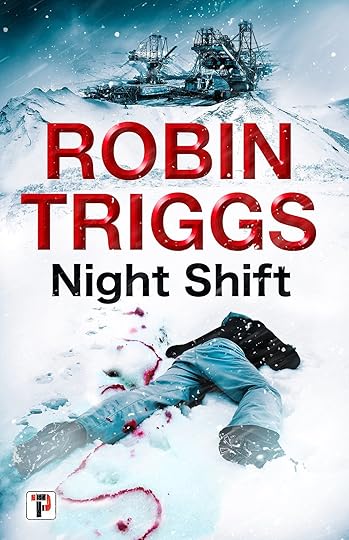
Night Shift (Fiction Without Frontiers)
By Robin Triggs
My rating: 1 of 5 stars
Robin Triggs delivers an initially-solid-but-ultimately-rage-inducing Antarctic mystery-thriller peppered with a few doses of low-key science fiction concepts, in his debut, Night Shift.
As the Australis base prepares for six months of darkness, a freshly-appointed security officer, Anders Nordvelt, arrives just in time for the crew to find themselves under attack. Obviously, it doesn't take long for Nordvelt to become the prime suspect in the baffling string of disasters befalling the Australis's researchers and miners, and Triggs keeps both Anders and readers guessing about the real culprit and his or her motivations in this little whodunnit.
The isolated Australis is positively rife with suspects, from the overbearing and sexually promiscuous base commander, right down to the janitor, Max, who keeps herself secluded from the rest of the crew and surrounded by jury-rigged robots and welded metal sculptures. Seemingly everyone has a motive, and as Triggs reveals new facets of his characters he gives readers plenty of meat to chew on as the guessing game wears on.
While the mystery aspect of Night Shift is pacey and intriguing, the science fiction aspects feel a bit tacked on, and even superfluous at times. Triggs gives us small doses of near-future tech and hints of a dystopic Company-ruled world at large, but these minor conceits are never explored deeply enough to feel wholly necessary. Even the book's climax, which ultimately hinges on the half-baked incorporation of these sci-fi elements, lacks the necessary oomph and depth of information to really deliver a powerhouse of a finale as the culprit's motivations come unraveled.
After seeing how the all pieces fell together, I was still left with a frustrating question of why? Why was any of what happened necessary? Unfortunately, Night Shift isn't able to provide a satisfying answer to resolve its own premise, and Triggs simply doesn't do enough world-building or provide us with enough information to make the culprit's motivation for the attacks feel smooth and logical. Worse still, in a brief supplemental interview with the author at book's end, Triggs compounds the lack of information in Night Shift with a promise to explore all this stuff in better detail over the course of a trilogy. As far as I'm concerned, it's a cardinal sin, as well as a rage-inducing annoyance, to knowingly fail to properly execute a narrative in book one, hinging the importance of your book's finale on concepts reserved for book two, and promise to make it up to readers at a later date. Night Shift's finish is the type of cash-grab finale that makes me hate the whole damn thing, which is a shame because I did enjoy most of it, right until it royally pissed me off for wasting so much of my precious time.
The bulk of Night Shift is a breezy and engaging enough read, right until the book's last few chapters where it quickly falls apart and devolves into a supremely frustrating experience as Triggs delivers a softball non-ending that serves only to provide fuel for additional mysteries regarding a concept that felt largely extraneous to begin with. It's a book that I mostly liked, right up until the bait-and-switch revelation that Night Shift is intended to be the first in a trilogy. Triggs gives us an interesting bit of mystery in the Antarctic, a location I absolutely love to see explored in fiction, but fails to stick the landing, delivering a finale that's cheap and flimsy, and, worse, predicated upon its expectation that readers cough up for more time and money for a sequel if they want the real story.
[Note: I received an advanced reading copy of Night Shift from its publisher, Flame Tree Press.]
View all my reviews
November 9, 2018
Review: The First Cut (Gushers Series, Book 1) by Chuck Buda [audiobook]
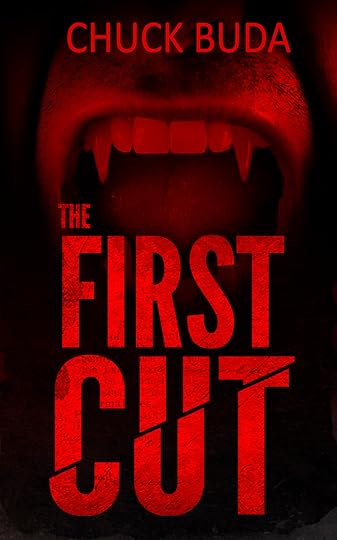
The First Cut: A Dark Psychological Thriller (Gushers Series Book 1)
By Chuck Buda
My rating: 4 of 5 stars
Do you like a little bit of horror in your pornography? Or maybe a lot of pornography in your horror? Because if so, hoo boy, Chuck Buda has got a doozy for you with the first in his aptly titled Gushers series, The First Cut.
What ever are a bunch of sex-starved high school seniors supposed to do as they bide their time for graduation and the start of college but form a secret society among themselves to get their rocks off? What seems like a good idea quickly escalates into something more as power-hungry Zoe leads them off into darker realms with some cult-like practices, with some support from her second-in-command Spencer, a young man with a strong interest in the Dark Arts, and a lot of hot tub orgies. A lot. Of hot tub. Orgies.
The First Cut comes with a reader advisory warning, and Buda ain't messing around there. This sucker is explicit in its erotic endeavors and nothing is left to the imagination as Zoe leads all the boys around by their nether regions, and even a pair of the kid's parents engage in some secret extramarital shenanigans. There's plenty of taboo titillation throughout, but since this is a horror book some scenes veer pretty far from the Penthouse Letters style as these characters' hook-ups go from amorous to aberrant. All kinds of bodily fluids gush and spill and mix together as the group seek new thrills and new highs.
Cutting through all the sex and violence is a surprisingly sweet center in Aiden and Leah, the quiet ones of the group who find their friendship deepening and blossoming into something more meaningful as their closest friends grow ever more hedonistic. Their relationship isn't without its fair share of complications, obviously - being in an insane sex cult presents its own fair share of hurdles - but Buda makes good use of their position in the story as the moral middle, their mostly-normal relationship providing a necessary and much-needed break from the more extreme craziness.
Narrating all this madness is Lillie Ways, who delivers an even-keel and professional reading. She differentiates character voices enough to make those conversations lacking dialogue tags easy to follow, and keeps the book's 54 short chapters moving along a nice pace for its six hour run-time. All in all, The First Cut provides a pleasing, at times surprising, aural experience.
Readers looking for some hot-and-heavy erotic horror in the split veined style of the Hot Blood anthologies should have a good time with The First Cut. These cherry-popping cultists will do you right...just before they do you very, very wrong.
View all my reviews
November 8, 2018
Review: Devouring Dark by Alan Baxter
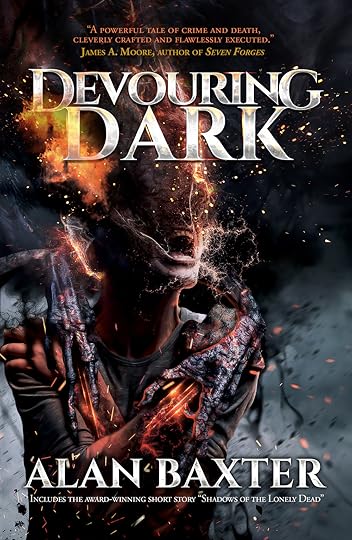
Devouring Dark
By Alan Baxter
My rating: 4 of 5 stars
Devouring Dark, the latest from Alan Baxter by way of Grey Matter Press, is a solid cross-genre affair, entertainingly blending supernatural horror and crime.
Matt McLeod has a darkness within him. Quite literally as it turns out, as he can summon this darkness and use it to kill those who have done wrong. In the book's opening chapter, we get a delicious taste of McLeod's peculiar brand of vigilante justice as he stalks and kills a pedophile in a London alley. In a stroke of coincidence that promises to not bode well for Matt, his exploits are caught on the cell phone camera of a hoodlum who works for local mobster Vince Stratton. Stratton thinks he can use Matt as an assassin, but Matt's none too keen on this idea. Add into the mix a nurse, Amy, who shares similar talents as Matt, and soon enough you're off to the races in a frenetic game of cat-and-mouse.
There's a lot of neat layers to Devouring Dark, and I had a lot of fun reading it, particularly as Matt works at digging his way out from under Stratton's thumb. Baxter builds an interesting web to connect his characters, although there's an awful lot here that hinges on coincidence. Thankfully, the story moves fast enough, the characters are involving enough, and the challenges befalling them are sufficiently difficult enough, that some of the overly lucky (or perhaps unlucky is more apt) strikes lining them all up just so aren't entirely noticeable or distracting on first pass.
Baxter has a great knack at using his character's voices to great effect, alternating chapters between their varied points of view, giving readers a nice array of perspective to view the story through. Although Matt is arguably the lead protagonist, it's Amy Cavendish who really shines and provides a few bright spots throughout the narrative. Amy's gift is similar to Matt's curse, but her role as a nurse, as well as her understanding of her power, allows her to use the darkness in a strikingly different way, but one that's true to her humanity.
Amy is also a conduit for Baxter, allowing him to speak up a bit on issues of palliative care and the ignominy of death. Baxter, Amy, and I find ourselves in full agreement on the issue of how we treat our sick and dying relatives from a medical perspective versus the ease with which we can end a pet's suffering. Despite our medical and scientific advancement, medically assisted suicide for human beings is still deeply taboo, but I'm more than sympathetic to the author's viewpoint, having had similar thoughts and discussions myself after losing loved ones to prolonged and painful illnesses.
Although it's a crime story first and foremost, Baxter does manage to fit in a vital message, one that I'd hope more people would give conscious thought and action toward, and I appreciate his willingness to broach it in both Devouring Dark and the bonus short story, "Shadows of the Lonely Dead," included at book's end. Mind you, Devouring Dark is hardly a treatise on the pros of assisted suicide, so if you're one of those who fret about politics in their fiction, worry not. Such moments are small in the sum of this book, but there are a few worthwhile, and dare I say vital, scenes that provide some necessary food for thought.
[Note: This review is based on an advance reading copy provided by the publisher.]
View all my reviews
November 5, 2018
Review: The Consuming Fire (The Interdependency #2) by John Scalzi [audiobook]
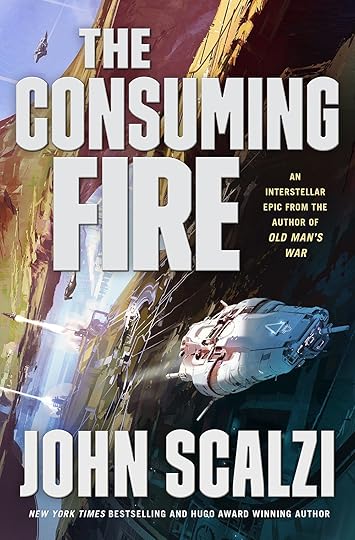
The Consuming Fire (The Interdependency)
By John Scalzi
My rating: 4 of 5 stars
Readers who enjoyed John Scalzi's previous entry in his latest series, The Interdependency, should find The Consuming Fire a fun romp. That said, being a second book in a trilogy, it does have a fair bit of middle-child syndrome, even if it is, overall, an engaging and fast-paced listen.
The Collapsing Empire, 2017's most appropriately named book release, set the stage for this series with its central premise of interstellar travel by way of the Flow (think rivers in space) and what will happen to these intergalactic civilizations when those streams begin to collapse. As The Consuming Fire picks up, more Flow streams are collapsing, setting off a political shitstorm between Emperox Grayland II and the ruling houses either hellbent on denying the science behind the Flow's collapse or usurping the throne in order to further their own power.
There's a dark vein running through the core of The Consuming Fire, what with its promise of civil war, attempted assassinations, and ENTIRE FUCKING PLANETS FULL OF PEOPLE being cut off from civilization and the resources required to keep them alive as the Flow disappears to condemn everybody to certain death. And yet, somehow, Scalzi avoids miring this series in prolonged, protracted portrayals of misery. The political shenanigans involving various houses competing for control of the empire recall a certain Game of Thrones In Space! element, but The Consuming Fire never devolves into violently brutal bloodbaths and Scalzi is hardly the sadist George R.R. Martin is, even though his plot promises the untimely deaths of waaaaaaay more people than Martin ever conjured to kill. No, somehow Scalzi manages to keep it all fairly light and, somehow, comical, even when bodies are hitting the floor.
Operating as an allegory to climate change and how the rich and powerful attempt to profit from science denialism in order to become even more rich and powerful, right up until the moment of complete and utter collapse, really shouldn't be this entertaining. Yet I found myself laughing frequently, thanks to Scalzi's wordsmithing, particularly at one point late in the book when a formerly human-now artificial intelligence jokes about dying in the flow.
“We have to talk about your sense of humor,” the formerly human-now AI is told.
“It was like this before. How do you think I died?”
Yeah, I couldn't help but laugh out loud at that one. A lot of this is due to Wil Wheaton's narration. The Collapsing Empire was my first introduction to both Scalzi as an author and Wheaton as a narrator, and I immediately fell in love with the both of them. It was apparent right from the start that Wheaton is a perfect match for Scalzi's work and sensibilities, and Wil just flat-out gets it. The Consuming Fire isn't just funny, it's goddamned snarky, and Wheaton does a fine job delivering snarkiness. Having been an actor since his childhood, he brings along that element of role-play to his audiobook narrations, injecting the reading with emotion and verve that really keeps things hopping along nicely.
The Consuming Fire is a worthy follow-up to the prior book, and while it doesn't advance the story of The Interdependency in huge leaps and bounds Scalzi does inject a few interesting wrinkles and side adventures for his cast of spacebound lords and ladies. Being the middle-child, its primary mission is to move certain pieces into place for the grand finale next book, and Scalzi does this really well, presuming that the next book, ominously (or at least tentatively, per Scalzi's February 2018 blog update) titled The Last Emperox, is indeed the last. Throughout this necessary bit of set-up, though, Scalzi at least injects enough new stuff, and even a few new mysteries, to make it a highly worthwhile listen. Plus, it's just damn good fun, and that's always welcome and necessary considering the time and reality we currently live in.
View all my reviews
November 3, 2018
Review: The Sea Dreams It Is The Sky by John Hornor Jacobs
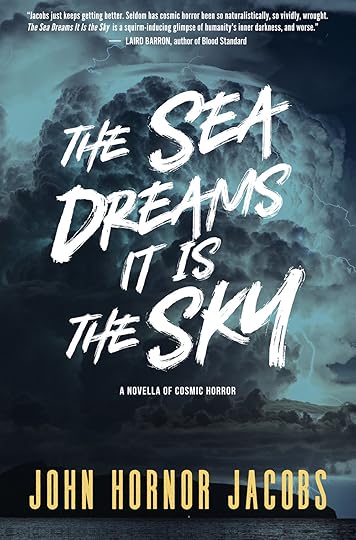
The Sea Dreams It Is the Sky: A Novella of Cosmic Horror
By John Hornor Jacobs
My rating: 5 of 5 stars
Although H.P. Lovecraft is the most familiar name in the genre of cosmic horror, a number of other authors writing in this vein have shown themselves to be far better wordsmiths and storytellers - Victor LaValle, Brian Hodge, Laird Barron, and Caitlin R. Kiernan immediately spring to mind. I feel comfortable adding John Hornor Jacobs to this list now, with his novella The Sea Dreams It Is The Sky proving to be one of the best titles I've read in 2018 (and 2018 has been absolutely flush with incredible horror titles, I might add).
Racism was absolutely endemic in Lovecraft's work, with the man's total fear of Otherness, which is to say blacks and immigrants, pervading his mythos. Jacobs, however, writes entirely from the perspective of The Other - his central characters, Isabella and Rafael Avendaño, are South American expats living abroad in Spain. Their home country, the fictional Magera, has fallen to a Pinochet-like military junta. If either were ever to return home, it would mean certain death. Isabella is a lesbian, and, perhaps worse for those in power, both educated and an educator. Avendaño is a poet and outspoken critic of the despot ruling Magera.
Whereas Lovecraft's horror arose from racist anxieties, in Jacobs's novella, political anxiety is the topic du jour, and certainly one that's far more relatable for this reader. Although set in 1987, The Sea Dreams It Is The Sky is unfortunately timely. The far-right threats of political violence stemming from the fictional Vidal's rule that threaten Isabella and Avendaño echo current global trends and the rise of nationalism. Brazil recently returned to a military dictatorship with the election of Jair Bolsonaro, the 'Trump of the tropics,' and with him came military raids of that country's universities earlier this week, a turn of events that makes Isabella's fears of returning to Magera sadly relatable. The threats to Avendaño's life simply for being an outspoken critic of an authoritarian regime vividly echo life under Trump part and parcel every bit as much as they recall life under Augusto Pinochet, and one can't help but wonder if a bomb is going to make its way into Avendaño's mailbox at some point in the narrative. The Sea Dreams It Is The Sky functions as a fictional examination of historical incidents that occurred in the 1960s-1980s, while also encapsulating the worries of political extremism circa 2018.
Much of the horror stems from the fear of the Mageran junta, with the comic elements playing only a minor role in the story's backdrop. The Sea Dreams It Is The Sky certainly has its share of horror, and a few squirm-inducing scenes to be sure, but it's of a quieter, slower, and highly literary nature. The characters come first in Jacobs's story, and we get small hints of their history and past lives in the homes they were forced to flee. It's not until nearly the half-way mark that we experience a fully unflinching view of the junta's atrocity as told through Avendaño's view, and the horrors that unfold therein are almost entirely human, with only brief glimpses of the supernatural.
Primarily, we experience this story, and Avendaño, through Isabella's eyes. Her position as an educated woman informs Jacobs's style, as does Avendaño's pedigree as a poet, and the writing is whip smart with the prose taking on a deeply literary aspect. Avendaño speaks with a poet's grace, his words reflecting his perspective. When he speaks on even minor topics, such as the luchador horror films he routine frequents at the cinema, he speaks of grander philosophies: "Misery is a condition that we are all promised," he tells Isabella early on. "On the screen, painted in light, that misery is very small." Isabella lives the life of a professor, but is far from cloistered within the halls of academia - she has passions and love interests, and can be tough when required. Jacobs subverts one's expectations of the nerdy damsel in distress, and even Isabella reminds us in her narrative that "I am as sensitive to situation and intuition as any person. The idea that academics—especially female academics—are cloistered aesthetics that retreat from the real world to content themselves only with books is nonsense."
The Sea Dreams It Is The Sky is a smart and deeply layered novella, and its depth routinely belies its page count. This is a lushly literary narrative, one that is first and foremost a character study of political exiles, and Jacobs's authorial skills are tack sharp. Highly recommended.
View all my reviews
October 31, 2018
Review: Harvest Moon: A Tale of the Beldam Woods by James A. Moore
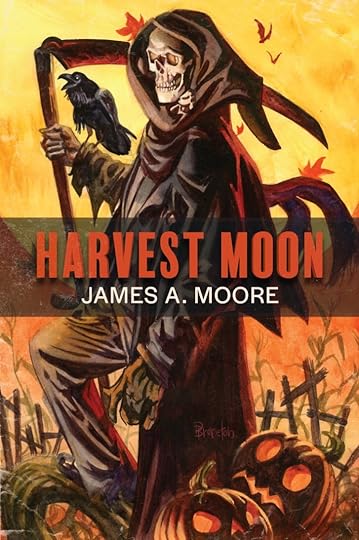
Harvest Moon: A Tale of the Beldam Woods
By James A Moore
My rating: 4 of 5 stars
With the days growing longer and the veil separating this world from the next growing thinner and thinner, I decided to turn to James A. Moore for some October spookiness. I'm gonna go ahead right now and pat myself on the back for this smart decision.
Right from the outset, Harvest Moon captures the feel of Halloween. As Moore takes us around the small town of Beldam Woods and introduces us to a number of the locals, you can practically feel the crispness of a chill fall wind on your neck and hear the skittering of freshly fallen leaves against pavement. Beldam Woods feels instantly familiar, but where it stands uniquely on its own is in the town's local legends about the wicked witch of the woods and her three grotesque sons. And while the witch was murdered by townsfolk long, long ago, her children still remain, plotting to resurrect her and make the town of Beldam Woods pay dearly for their sins.
Moore introduces us to these small town legends by way of a children's story, but as Harvest Moon progresses it becomes readily apparent that the town's myths have been severely sanitized in their tellings over the years. The true nature of Beldam's horrors are far more serious, and far more deadly, than the kid's fables surrounding them. A series of vicious murders and a spate of seemingly random crimes leaves police officer Craig Gallagher to sort through the mess, all of which points towards the impossible.
The premise behind Harvest Moon is a lot of fun, with plenty of pumpkin pulp horror to spare, and I dug the urban legend vibe that was introduced in the book's opening chapters. There is a certain degree of silliness to the nature of Beldam Woods's threats, particularly in their initial presentation as fodder for children's entertainment, but over the course of the novel Moore does a fine job establishing the villains as legitimate, very adult, horrors.
Although Harvest Moon was published a number of years prior to the television series Sleepy Hollow, the Tom Mison-led Fox TV show is the closest example I can think of to capture the tone and spirit Moore affects here. If you dug Sleepy Hollow, particularly its first season, I suspect you'll be able to find plenty to enjoy in Beldam Woods. While I would have liked a beefier ending and a bit more time spent in the chaotic "final" encounter, I really can't lodge many complaints here. Mostly, I found myself just wanting to spend more time in and around Beldam Woods.
Harvest Moon has its moments of grotesqueness, elements of fantasy and fable, and supernatural threats and monsters the Beldam locals must face, but even in its darker moments there's an overriding sense of fun, an almost comic book-like glee to the mayhem. Perfect fodder, then, for those long, cold nights leading up to Halloween.
View all my reviews
October 30, 2018
This Blog Kills Fascists

In case you were living under a rock last week, let’s recap some of the big news events: Cesar Sayoc, a Trump supporter, mailed bombs to more than a dozen prominent Democrats critical of Donald Trump, individuals that Trump frequently named and labeled as enemy of the people in his campaign rallies. The week was then capped off with a mass shooting at a Pittsburgh synagogue that left 11 dead and another nine injured. The shooter, a white supremacist named Robert Bowers, was arrested. In Kentucky, Maurice Stallard and Vickie Jones, both black, were shot to death in Kroger after their murderer, Gregory Bush, was thwarted in his attempt to enter a predominantly black church. I can only guess what his motivations for seeking entry to a black church were, or who he voted for in 2016. I can only guess, but I feel pretty sure my hunches are solid.
While these and other more recent events were swirling through the news media, several indie authors in the science fiction and post-apocalyptic/dystopian communities were posting messages on Facebook and Twitter, helping to further promote far-right conspiracy theories like PizzaGate, or that the survivors of school shootings are crisis actors, or that more journalists need to be dismembered, or that Democrats were mailing bombs to themselves as part of a false flag operation in the lead up to mid-term elections, or posting in support of Donald Trump using Executive Orders to eliminate Constitutional amendments that favor non-white immigrants or encouraging him to use the United States military to slaughter migrants across the border for what amounts to shits and giggles. Sad to say, I had read and reviewed some of these authors’ works in year’s past, some of them positively as it happens.
If you’ve been following me here or on social media for any length of time, you‘re likely aware that I am not a Trump supporter. The United States has entered a particularly dark period in the wake of the 2016 elections, with the erosion of civil rights, calls for violence against protesters by Trump himself, the construction of concentration camps along the US-Mexico border to house children forcibly separated from their parents, a sharp increase in hate crimes, the appointment of a drunken rapist to the Supreme Court, reminders that white supremacists are very fine people, and on and on and on and on. Frankly, even just keeping track of our rapid race toward authoritarianism is exhausting…

Trump supporters. Source: Reuters (Nov. 6, 2016)
The rise of Trumpism has prompted me to do a lot of soul searching and I’ve become more politically active and outspoken in the build-up to the 2016 elections and its disastrous aftermath. I do not believe that anybody of good moral fiber can continue to support Donald Trump and this administration, and I will not allow my blog to become a platform for those authors who support him and promote insane conspiracy theories about false flag operations and the like, and seek to further erode the fundamentals of our republic. I will not allow this blog to support those who support racism, bigotry, and fascism. And at this point, in 2018, I do firmly believe that supporting Donald Trump is in every respect support of racism, bigotry, and fascism. If you support Trump, you’re clearly pretty goddamn comfortable with this kind of shit, and this blog is not a home for you and never fucking will be.
Now, prior to the rise of Trump I had (albeit inadvertently) supported some of the authors who now openly and casually promote far-right radicalism simply because I did not know, at that time, of their extreme political beliefs and their contempt and hostility toward their fellow Americans or our secular Constitution. Prior to 2016, it wasn’t really very cool to openly and proudly proclaim yourself as a bigot, racist, authoritarian nutjob, and such authors were able to fly under the radar, wisely keeping their Tiki torches unlit, with reviewers and authors like myself unaware of their radicalism. They didn’t have red hats to proudly out themselves with as traitors to the USA. But, in 2018, these folks are big fans of telling us just how proudly deplorable they are, reminding us that there is no bottom to how low they are willing to sink in order to stick it to the libs, up to and including support of homegrown terrorism and assassination attempts.
When I first began to become aware of some of these authors’ political leanings in the final years of Obama’s presidency, I made the conscious decision to discontinue public support of their works. I didn’t want to spend money on authors rallying against LGBT and women’s rights and supporting politicians shouting out loud about how rape was God’s gift to women, and I was certainly in no mood to review their works. I simply stopped reading them and stopped giving them my money, the same way I won’t give Orson Scott Card my money. I had left up those reviews of their various works, though, seeing no reason to eliminate such ties simply because of what I then saw as little more than differing political views at a time when our country was making some progressive headway and I could write off such kooks as being little more than fear-mongers and crazy old white dudes living in the past. I mean, they were mostly harmless right? I could quietly ignore them, and instead of buying their books I could just send some money over to ACLU instead. I read their books until their political leanings helped me decide they no longer worthy of my financial support.
Well, things have changed a lot in only a few short years. Those authors who were merely self-identifying as conservative, and who I was then foolish enough to accept at face value, are now promoting extreme levels of intolerance in support of a far-right agenda. Or, maybe they always were and I was too naive, too stupid, too privileged to clearly see them for who they were, and, in fact, truly are. Their views are no longer something so small and simple as mere political difference. This isn’t a disagreement over the utility of taxation or whether or not we should be allowed clean drinking water. This is, at the most fundamental level, good versus evil. This blog will not support those who are, in their hearts, evil.
I’m a firm believer that people will let you know who they really are, and that you should believe them. When somebody hops online to rant about how gay marriage causes hurricanes, it’s safe to say they’re just some backward moron. When somebody is taking to Twitter to attack the survivors of a school shooting, it’s safe to say that somebody is huge sack of shit. When somebody takes to Twitter to say that Obama mailed himself a bomb and is carrying out a False Flag attack, it’s safe to say that somebody is wickedly stupid and insanely detached from reality. These are people I will not support. Ever. I regret even having shown any modicum of support for these types of authors in the past, fucking blind as I was to the intense amount of hatred and loathing they carried for my country and its citizens. Supporting authors who are now condoning the murder of high school students and politicians is, in my view, supporting atrocity. I will not abide by that, and I’ve since begun removing my reviews of their works.
I will not name the authors that I have deleted from this site, but I spent a good chunk of time over the weekend weeding out reviews for these authors books. I do not want to be seen as providing a safe quarter to such extreme individuals, or helping to promote their works. And before any useful idiots in the crowd start crying “censorship!”, well… 1. Fuck you. 2. This is my blog and I can post and delete at will.
I will not condone or support those who condone or support tyranny, treason, murder, racism, and bigotry. Full stop. By having reviews, good or bad, of their works on this blog, I felt it was helping to potentially draw awareness to their works and support their careers as authors. Given their social media habits and outspoken alt-right beliefs, supporting them means supporting the erosion of the United States and our values as a nation. I cannot in good conscious support these authors or their radical beliefs. Knowing that name searches for these individuals could point directly toward this particular blog left me feeling dirty, so I sought to correct that.
I will not name the authors impacted here, but know that I have removed a handful of reviews from this site, Goodreads, and Amazon. Know, too, that in the future I will not knowingly review or support those authors whose beliefs run entirely antithetical to the basic human rights of life, liberty, and the pursuit of happiness. If you’re pro-fascism, you have no place on this site. If you’re an author I have reviewed and I discover that your predilections side with terror and tyranny, I have no problem deleting those reviews and eliminating for you at least one avenue of attention. I will not aid you, and I will not support your or your work. This blog kills fascists.
October 26, 2018
Review: Dark Harvest by Norman Partridge
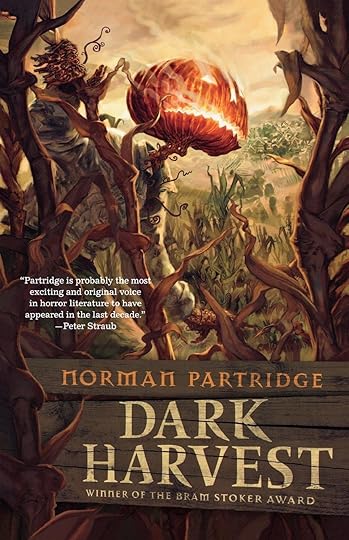
Dark Harvest
By Norman Partridge
My rating: 5 of 5 stars
Without fail, virtually every Recommended Halloween Reads list I see that's worth its salt mentions Dark Harvest, a Bram Stoker Award winner and World Fantasy Award nominee. Any time I ask, or see somebody else asking, for some Halloween recommendations, Dark Harvest invariably comes up. It's one of those titles that is considered a classic by many, a mandatory October read. High time that I read it, then.
And you know what?
I freaking loved Dark Harvest. Presuming I don't suffer any serious blows to head anytime soon, the next time somebody asks me for some Halloween reading recs I'm pretty damn sure Dark Harvest is going to be at the top of my list. Norman Partridge has written an essential Samhain story, and the October Boy is a quintessential piece of Halloween.
Right from this novella's opening pages, I was sucked in. Partridge's authorial voice is mightily effective, the writing tight and hypnotic. The first few pages are devoted to corn stalks withering and weeds growing - in less capable hands, this stuff would not be even the least bit attention grabbing and yet Partridge demands your full attention, luring you in as he breathes life into the October Boy, a supernatural scarecrow-like being with with a carved pumpkin head. Every year, the October Boy comes to life, hunting the teenage boys of a small town and hacking his way through those hunting him in return. Rest assured, there's a bit more going on here, but I won't spoil the details.
For the entire duration of Dark Harvest, I found myself lost in Partridge's narrative. I didn't want to leave his story world. I could not and did not put the book down until I was finished. It's incredibly rare that I'm able to read anything of a substantial page count in a single sitting, and yet I did so with Dark Harvest. I don't even remember the last time something like that happened. Given the insurmountable nature of my TBR pile, I don't allow myself the luxury of re-reading my favorites, and yet I'm already anticipating cracking this book open again come next October.
Dark Harvest is an award winner, a classic according to more than a few, a must-read Halloween treat. Turns out, there's a damn good reason for that. Partridge has given us one hell of a bounty with this particular harvest, one that I suspect is going to keep on giving year after year.
View all my reviews



